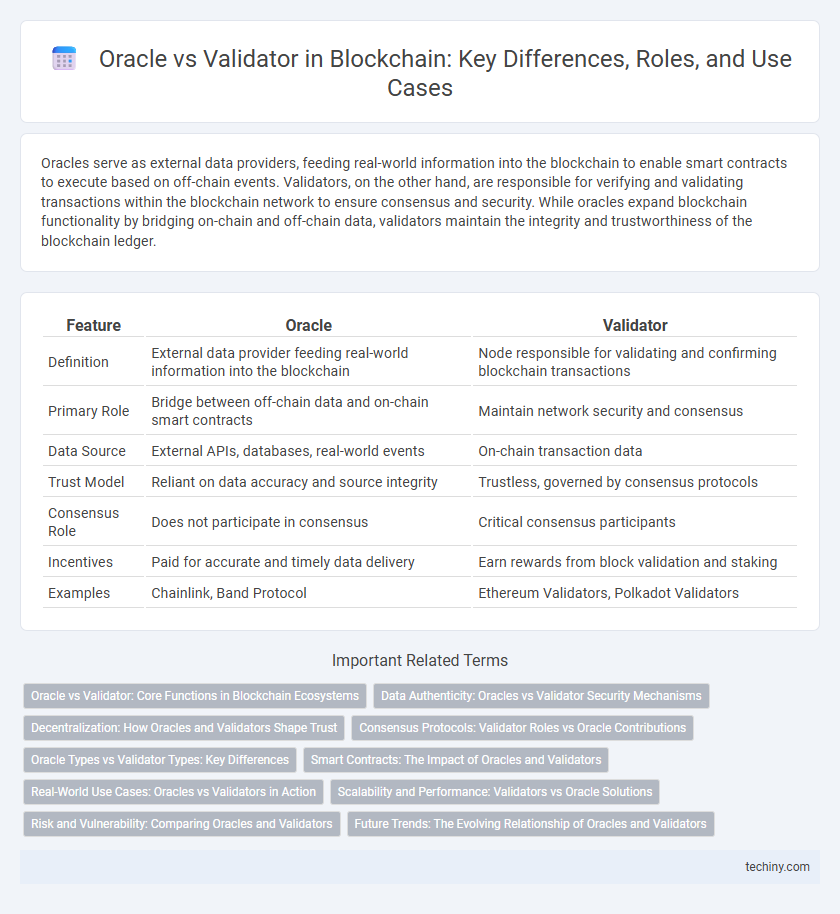Oracles serve as external data providers, feeding real-world information into the blockchain to enable smart contracts to execute based on off-chain events. Validators, on the other hand, are responsible for verifying and validating transactions within the blockchain network to ensure consensus and security. While oracles expand blockchain functionality by bridging on-chain and off-chain data, validators maintain the integrity and trustworthiness of the blockchain ledger.
Table of Comparison
| Feature | Oracle | Validator |
|---|---|---|
| Definition | External data provider feeding real-world information into the blockchain | Node responsible for validating and confirming blockchain transactions |
| Primary Role | Bridge between off-chain data and on-chain smart contracts | Maintain network security and consensus |
| Data Source | External APIs, databases, real-world events | On-chain transaction data |
| Trust Model | Reliant on data accuracy and source integrity | Trustless, governed by consensus protocols |
| Consensus Role | Does not participate in consensus | Critical consensus participants |
| Incentives | Paid for accurate and timely data delivery | Earn rewards from block validation and staking |
| Examples | Chainlink, Band Protocol | Ethereum Validators, Polkadot Validators |
Oracle vs Validator: Core Functions in Blockchain Ecosystems
Oracles serve as trusted data bridges, feeding external real-world information such as price feeds and event outcomes into blockchain networks, enabling smart contracts to execute based on accurate external data. Validators maintain the blockchain's integrity by verifying and validating transactions, ensuring consensus through mechanisms like Proof of Stake or Proof of Work, and securing the network from malicious activity. While oracles provide critical off-chain data inputs, validators sustain the on-chain consensus and ledger accuracy, making both essential for robust decentralized ecosystems.
Data Authenticity: Oracles vs Validator Security Mechanisms
Oracles provide external data authenticity by securely fetching and verifying off-chain information through cryptographic proofs and consensus from multiple trusted sources. Validators ensure on-chain data integrity and transaction validity using consensus algorithms like Proof of Stake or Byzantine Fault Tolerance to prevent double-spending and fraud within the blockchain. Combining oracle data authenticity with validator security mechanisms strengthens overall trust and reliability in decentralized applications.
Decentralization: How Oracles and Validators Shape Trust
Oracles and validators both play crucial roles in blockchain decentralization by enabling trustless data verification and consensus. Validators maintain network integrity through consensus mechanisms like Proof of Stake, ensuring transaction validity across decentralized nodes. Oracles bridge off-chain data with on-chain smart contracts, so decentralizing oracle networks prevents single points of failure and maintains reliable, tamper-resistant data feeds critical for trust.
Consensus Protocols: Validator Roles vs Oracle Contributions
Validators are integral to consensus protocols by verifying and validating transactions, ensuring network security through mechanisms like Proof of Stake or Delegated Proof of Stake. Oracles provide external data feeds to smart contracts, enabling blockchain applications to interact with real-world information while relying on off-chain data sources. The synergy between validators and oracles enhances blockchain functionality, with validators maintaining on-chain consensus and oracles expanding blockchain utility via trusted data inputs.
Oracle Types vs Validator Types: Key Differences
Oracles in blockchain act as data providers that fetch and relay real-world information to smart contracts, with types including software oracles, hardware oracles, inbound oracles, and outbound oracles. Validators are network participants that confirm transactions and maintain consensus, categorized as full validators, light validators, and delegated validators. The key difference lies in their functions: oracles bridge external data with the blockchain ecosystem, while validators verify transactions and secure the network.
Smart Contracts: The Impact of Oracles and Validators
Oracles play a crucial role in smart contracts by providing reliable external data that triggers contract execution, bridging the gap between blockchain and real-world information. Validators ensure the integrity and security of blockchain transactions by verifying and confirming the accuracy of data within the network. Together, oracles supply trustworthy external inputs while validators maintain consensus, enabling smart contracts to function accurately and securely across decentralized environments.
Real-World Use Cases: Oracles vs Validators in Action
Oracles bridge blockchain networks with external data sources by securely feeding real-world information like price feeds, weather updates, and event results into smart contracts, enabling decentralized applications to interact with off-chain data. Validators, on the other hand, maintain network security and consensus by verifying transactions and producing new blocks within blockchain protocols such as Ethereum 2.0 or Polkadot. In practical use cases, oracles empower DeFi platforms to execute trades based on real-time market data, while validators ensure transaction integrity and network reliability for staking and governance operations.
Scalability and Performance: Validators vs Oracle Solutions
Validators play a crucial role in maintaining blockchain integrity by verifying transactions and ensuring consensus through decentralized networks, which can impact scalability due to the resource-intensive consensus mechanisms like Proof of Work or Proof of Stake. Oracle solutions enhance blockchain performance by securely supplying external data to smart contracts, enabling faster and more versatile decentralized applications without burdening the core network. The combination of efficient validators with robust oracle designs drives improved scalability and optimized throughput in blockchain ecosystems.
Risk and Vulnerability: Comparing Oracles and Validators
Oracles face significant risk due to their reliance on external data sources, making them vulnerable to data manipulation and single points of failure. Validators, while crucial for network consensus and transaction validation, are exposed to risks like staking attacks, censorship, and collusion among malicious actors. Both components require robust security measures, but oracles inherently carry higher external data integrity risks compared to validators' protocol-level consensus vulnerabilities.
Future Trends: The Evolving Relationship of Oracles and Validators
Oracles and validators will increasingly collaborate to enhance blockchain interoperability and data reliability, driving the integration of real-world data with on-chain processes. Innovations in hybrid consensus models and secure multi-party computation are projected to redefine their roles, improving scalability and security in decentralized networks. Emerging trends indicate a future where oracles not only feed data but also participate in validation, fostering decentralized trust and automated smart contract execution.
Oracle vs Validator Infographic

 techiny.com
techiny.com